Yoruba People | Culture, Tribe & History
The Yoruba people are a tribe in Africa that once dominated Yorubaland and built a thriving economy, but were subjugàted under European impèrialism until they gained their independence in 1954.
Frequently Asked Questions
What is the Yoruba tribe known for?
One of the most famous aspects of the Yoruba tribe is their drumming. Drums characterize Yoruba music and are a prominent part of Yoruba festivals.
What is unique about Yoruba culture?
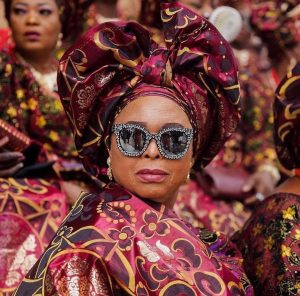
There are many unique aspects of Yoruba culture. These include the prominence of drumming in their music, their extensive use of wood in artwork, and their unique hierarchical style that follows the structure of their families.
What are some traditions or values of the Yoruba tribe?
One tradition of the Yoruba tribe is to hold a festival every year to celebrate their ancestors. Another is the worship of Sango, the g0d of lightning, for which the Yoruba have created a specialized group of worshippers.
What do the Yorubas believe?
Yorubas believe that they were created by the same god who created the town that holds their capital city. They also believe in various elemental gods, and have over four hundred deities.
Is Yoruba a religion?
The word “Yoruba” signifies many things. Among them are a distinct culture, religion, language, and lifeway. The native Yoruba religion contains over four hundred deities.
The Yoruba People: Overview
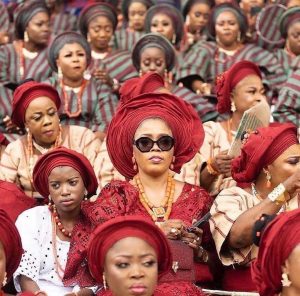
The Yoruba people are a tribe who live in and around Nigeria and Benin. They are a distinct group from other African tribes. There are more than three thousand tribes throughout Africa, each with a complex history. Yoruba are the dominant ethnic group in Nigeria and are a significant minority in Benin and Togo. During the strongest period of the Yoruba Oyo Empire, this ethnic group economically and politically dominated all neighboring tribes. Facets of their religion have influenced the religion of other ethnic groups, even influencing some versions of Vodou.
Where Do the Yoruba Tribe Live?
The majority of Yoruba people are located in West Africa. The Yoruba Tribe primarily live in the countries of Nigeria and Benin, and their diaspora live in other countries throughout Africa and the world. The homeland of the Yoruba people is called Yorubaland. Over 42 million members of the Yoruba tribe live in the region known as Yorubaland. Although a small part of Yorubaland is in the country of Togo, the Yoruba population there is lower than in the neighboring country of Ghana.
Nigeria
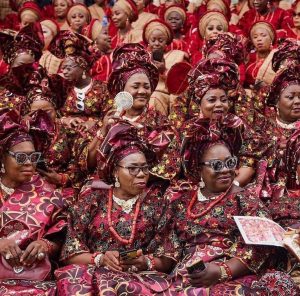
Around 37 million Yoruba live in Nigeria, which makes up the majority of Yorubaland. Yoruba culture, including language and foodways, is the dominant culture of Nigeria. For this reason, many people refer to Yoruban culture as Nigerian culture, and vice versa.
The Yoruba: History
The Yoruba have deep roots in West Africa. Yoruba history has thousands of years, and their culture developed over millennia. Although they are a distinct tribe from other African groups, the Yoruba people share some cultural traits with nearby groups.
Origins
According to the Yoruba religion, the Yoruba people were created by Odua (Oduduwa), the god who created the earth. Odua settled in Nigeria and, according to tradition, founded the town of Ile-Ife. His children were the rulers of the Oyo Empire.
According to cultural evidence such as linguistic patterns, two groups of people came to Yorubaland between 700 CE and 1000 CE. The second group of people became the largest and most influential group among the Yoruba people, mostly because they strategically situated their settlements near a forest and traded well with other cultures. Although they were powerful among the Yoruba people, they were not influential in inter-tribal affairs until the beginning of the 17th century.
The Oyo Empire
The Oyo Empire began around 1600 and eventually gained dominance over parts of Benin and Nigeria from 1650 to 1850, although some scholars claim their power started waning around 1750.
The Yoruba Culture
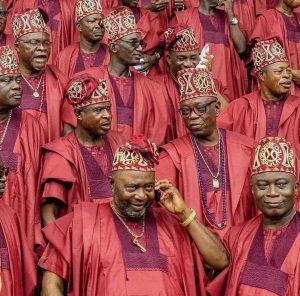
While the Yoruba share some cultural traits and characteristics with other nearby groups, they are a distinct group. For instance, the religion generally practiced by the Yoruba people is a native Yoruba religion. They worship Odua, a god-hero who formed the Earth and founded the Yoruba people. Another prominent god in Yoruba religion is Sango, the god of lightning, who has a fairly large group of worshippers throughout the world. These people maintain sacred artifacts associated with Sango. The Yoruba tribe has more than 400 deities, most of them elemental like Sango. Yoruba society is patrilineal, which means that one’s family is defined by the lineage of their father.
During the reign of the Oyo Empire, one of the most significant materials in Yoruba was coral from the coastal towns, which was used to make many items for the ruling class. Family was extremely important, to the point that the different regions in the Empire operated as a sort of extended family, and the regional rulers had similar relationships to each other as siblings did.

Yoruba cultural artwork is mainly made up of tangible creations such as sculpture, pottery, and beads. Significant Yoruba art forms include wooden sculptures developed in the 16th century and special pots that are reserved for deities. Most of the other pots were created by women for household use.
The Yoruba have many festivals (at least nine) celebrating natural cycles of the year, deities, and their ancestors. At the same time, they ascribe to none of their deities omniscience or supremacy. Their knowledge about their environment and other aspects of life were gathered by other members of their own culture.
Related Groups
Yoruba people are related to other cultural groups in West Africa, including those who reside in areas that directly border their own. These groups include:
Bariba
Nupe
Edo
Adja
Fon
Mahi
Egun
Lesson Summary
The Yoruba tribe is a distinct group of people who live in West Africa. Over 40 million Yoruba live in the world. The most concentrated populations of Yoruba are in Nigeria and Benin. The Yoruba have distinct languages, foodways, and music. At the same time, they are related to other ethnic groups in West Africa. The most famous Yoruba musical tradition is drumming. Yoruba music is heavily emphasized by drums, which are also a prominent part of religious and cultural events. Yoruba society is patrilineal. The religion generally practiced by the Yoruba people is a native Yoruba religion that is built around the worship of Odua, the god-hero who formed the Earth and founded the Yoruba people.
The first organized Yoruba civilization was the Oyo Empire. The Yoruba language and culture are related to those of surrounding groups of people, including the Baribe, Nupe, and Igala. The culture of the Yoruba tribe is inextricably connected with the tribe’s environment, and this connection pervades multiple aspects of their lifeways, including artwork and food.
Yoruba History
Humans evolved in Africa. That means that humans have lived in Africa longer than anywhere else, have had more time to develop distinct cultures, and these cultures have had more time to grow, change, and adapt. So it’s not surprising to learn that Africa is one of the most diverse places in the world, home to dozens and dozens of distinct ethnic groups.
One such group which has been gaining international attention for their arts, music, and role in African history are the Yoruba. The Yoruba are one of the largest ethnic groups in Nigeria and are also found in Benin and Togo to a smaller degree. Really, they’re not a single people but rather a collection of groups that all share a common language and culture and who have made an impact on Sub-Saharan Africa. This continent may be the ancestral home to all of us, but to the Yoruba, it’s still a place they’re proud to call home today.
So who are the Yoruba people? In terms of ethnolinguistics, the Yoruba belong to the Niger-Congo language family, which covers many cultures of that region. The Yoruba first appear in the written record from their interactions with Portuguese traders. Unfortunately, the early Yoruba people were not just merchants in this market but also parts of it; a large number of African slaves transported to the colonies of the Americas were Yoruba. This heritage is one reason for the recent global interest in Yoruba traditions.
The Yoruba region was invaded in the 19th century by another ethnic group, the Fulani, who pushed them south into the regions they occupy today. In the early 20th century, most Yoruba people fell under control of the British Empire, where they remained for about 60 years before Nigeria gained independence.

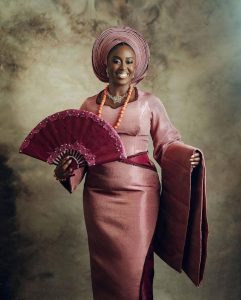
Leave a Reply